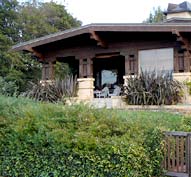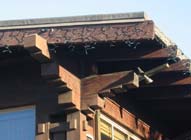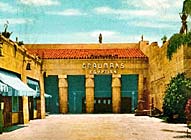




142 Adelaide Dr.
Listed on the National Register of Historic Places
Architect: Milwaukee Building Company / Meyer & Holler


Henry Weaver House, 1910

Another view
photo by Michael Grandcolas

Roof Detail
Henry Weaver House

Egyptian Theatre - Milwaukee Building Company
In Los Angeles: An Architectural Guide, David Gebhard and Robert Winter describe it as “A gorgeous example of Craftsman orientalism, worthy of Charles and Henry Greene.”
The property, which is listed on the National Register of Historic Places, was built for retired hotel proprietor Henry Weaver, who owned several Midwest hotels. It was through his hotels that Weaver heard about the Milwaukee Building Company. Not only did the company design and built the Henry Weaver House, they are also responsible for the Isaac Milbank House next door, among other prominent pieces of property around Los Angeles. The Milwaukee Building Company was established in 1905 as a design and contracting firm, with Mendel Meyer as President, Gabriel Holler as Vice President, and Julius C. Schneider as Secretary. In 1911, they were joined by Phillip W. Holler. The MBC later became the Los Angeles-based architectural office of Meyer & Holler, an eminent firm responsible for the design of numerous Southern California landmark buildings.
Meyer & Holler designed the Movie Studios in Culver City at 9336
Washington Blvd. A December 1, 1918 Los Angeles newspaper report described
the studio as a "motion picture plant that looks like a beautiful
Southern estate.”
In Long Beach, they designed the Ocean Center Building, Walkers Department
Store and the Fox West Coast Theater.
Their most famous designs were the Chinese and Egyptian Theaters in Hollywood. Meyer & Holler took their place in Hollywood history when they designed the Egyptian Theatre - the first true movie palace built in Hollywood. Completed late in 1922, impresario Sid Grauman hired the architectural firm to design the structure and the Milwaukee Building Company to build it. At this point in time, Meyer & Holler were one of the most esteemed architectural firms in Los Angeles.